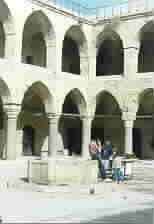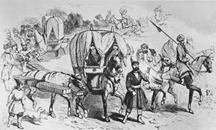The Story of Baha’u’llah: Promised One of All Religions
Excerpt 2: Terrible Journey
With every step of the mule, the howdah on its back jostled and swayed like a boat in rough seas. Inside, little Bahiyyih rode with her pregnant mother, Navvab. Another howdah carried the family of Mirza Musa, Baha’u’llah’s brother. Bells jingled on the harnesses of the other mules and horses, packed with provisions.

Baghdad lay six hundred miles to the southwest, on the far side of the Zagros Mountains. In the early stages of their journey, they crossed the Persian plains. Then the little caravan began the long days of climbing upward – across the Saveh Pass, across the icy and dangerous Qara Char River. The final stage lay across towering, snow-covered mountains.
The winter was harsh, its cold “’so intense that one cannot even speak,’” wrote Baha’u’llah, the “’ice and snow so abundant’” that it was “’impossible to move.’” The travelers suffered continually from the cold. They had neither the time nor money in Tehran to make the warm clothing needed for such a journey. . . .
. . . .Mile after mile, the animals plodded across the frozen mud of rocky paths and made their way through the snow. They could travel only fifteen to twenty miles a day. At night they sometimes camped outdoors in the wilderness. Other times they stayed in the simple stone rooms of a caravansary, a basic roadside inn for travelers.
 At the caravansary they were allowed only one room for each family and for one night only. There were no beds on which to sleep, and no light was permitted in the rooms at night, but it was a shelter from the winter outside. There they could sip some hot tea, share a few eggs between them, or eat a little cheese and coarse bread – except for Baha’u’llah. Still recovering from the effects of prison, He could not eat the rough food.
At the caravansary they were allowed only one room for each family and for one night only. There were no beds on which to sleep, and no light was permitted in the rooms at night, but it was a shelter from the winter outside. There they could sip some hot tea, share a few eggs between them, or eat a little cheese and coarse bread – except for Baha’u’llah. Still recovering from the effects of prison, He could not eat the rough food.
February turned to March as they finally traveled down the last mountains and out of Persia. Spring flowers showed their colors in the valleys, and trees were covered with the soft green fur of spring buds. At last they reached
the frontier of the Ottoman Empire. A group of Turkish soldiers came to escort them to the city of Baghdad. The Persian and Russian officers who had traveled with them returned to Persia.
It was nearly March 21, the date of the spring equinox and of Naw-Ruz – the Persian New Year. Baha’u’llah asked His brother Musa to ride ahead of the caravan and rent an orchard. There they would make camp and celebrate the days of Naw-Ruz.
Naw-Ruz was a joyful and generous time in Persia
– a festival celebrated there for centuries. People packed baskets of delicious food for picnics in the country.
They wore new clothes and visited friends, and those who could gave out gold coins. In every Persian home
a dish of wheat or lentil sprouts grew into tall, green shoots.
On the thirteenth day of the new year, the dish of green shots was thrown into a stream of running water. It was hoped that bad luck – like the green shoots in the swiftly mov-ing stream – would be carried away from their homes in the new year.
Baha’u’llah and the other exiles had neither new clothes, gold coins, nor mouthwatering feasts, but they had survived the terrible journey. Ice, snow, and freezing mountain winds were left behind. The campsite chosen by Musa was next to an orange grove, and the scent of orange blossoms wafted over them. Date palms grew all around. The green of winter wheat and barley stretched over the fields beyond. But their Naw-Ruz joy was bittersweet. Perhaps it was the sweet songs of birds that reminded them of Persia, the homeland they had left behind forever. At least they could be grateful to have one another.
They could be grateful for even more. Everything Baha’u’llah’s enemies had devised, He told them, had come
to nothing. Baha’u’llah had not died in the Black Pit. The family had not perished in the cruel winter journey of exile. These things were not a matter of Naw-Ruz luck. They were part of the plan of God. Baha’u’llah’s enemies had plotted to destroy the Cause of the Bab, but it, too, would survive and flourish. Baha’u’llah well knew what had been revealed in the Koran: “They plotted – but God plotted: and of plotters is God the best!”
On April 8, 1853 – three months from the time the exiles had left Tehran – Baha’u’llah and His family entered the eastern gate of Baghdad. The city they entered was a city of sixty thousand people in a province of the fading Ottoman Empire. A thousand years before, Baghdad had been a city of more than a million people – capital of the Islamic world. Through the centuries the city had survived wars, fires, and floods. Though it was no longer the city of splendors or the center of learning it had once been, Baghdad remained a crossroads of travel and trade.
The little caravan did not draw much attention. Travelers came to Baghdad every day. They came from
lands as far away as China, India, and Africa. They came in caravans of camels and mules, or in boats along the river. The great Tigris River flowed hrough the city, dividing
it in
two – the easten half
of Baghdad on one side,
the western half on the other.

Here in the ancient city once called “the Abode of Peace” by its founder, Baha’u’llah and His family would make their new home. But in their early days in Baghdad they would know more struggle than peace.
___________________________________________________________________________________________________________